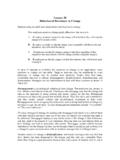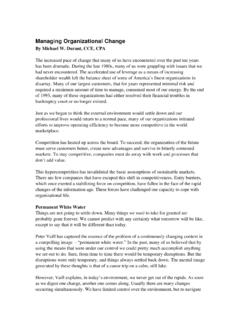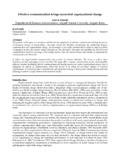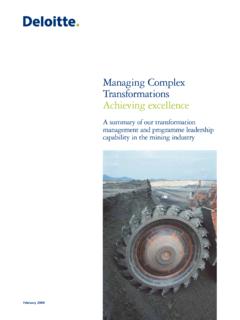Transcription of Managing Change in OECD Governments
1 Please cite this paper as:Huerta Melchor, O. (2008), " Managing Change in OECDG overnments: An Introductory Framework",OECDW orking Papers on Public Governance, No. 12, OECD publishing, Working Papers on PublicGovernance No. 12 Managing Change in OECDG overnmentsAN INTRODUCTORY FRAMEWORKO scar Huerta Melchor**OECD, France OECD Working Papers on Public Governance Managing Change in OECD Governments An Introductory Framework Oscar Huerta Melchor June 2008 3 FOREWORD In its programme of work and budget for 2007-2008 the Directorate for Public Governance and Territorial Development of the OECD (GOV) includes the realisation of a study on Managing Change in government .
2 The objective is to explore the different ways in which OECD countries are Managing the Change produced by the introduction of major reform initiatives intended to transform the administrative culture of the public service to make it more efficient and effective. In order to prepare the ground for study, GOV undertook a literature review and formulated a preliminary document submitted for discussion at the meeting of the Public Employment and Management (PEM) Working Party of the OECD in November 2007. Six OECD countries presented their experience on Managing Change : Finland, France, Italy, Portugal, Spain, and Switzerland. This paper draws preliminary conclusions that will require further exploration and discussion which may be part of a future work programme.
3 This project was led by Oscar Huerta Melchor (OECD, Secretariat) and reviewed by Elsa Pilichowski (OECD, Secretariat) under the supervision of Barry Anderson (OECD, Secretariat).The six case studies are revised versions of the reports presented at the PEM working party meeting in 2007 by the following government officials from OECD member countries: Finland: Mr. Veikko Liuksia, Director of Personnel Policy at the Ministry of Finance, Mr. Asko Lindqvist, manager of the Finwin programme; France: Ms. Fran oise Waintrop, General Directorate of the Public Service; Italy: Mr. Francesco Verbaro, Prime Minister s Office, Director of the Office for the Personnel of the Public Administration; Portugal: Ms.
4 Joana Ramos, General Directorate for Administration and Public Employment, Ms Teresa Ganh o, Directorate for Public Administration; Spain: Mr. Emilio Viciana Duro, Ministry for Public Administrations, Ms. Isabel Hern ndez, Ministry for Public Administrations; Switzerland: Mr. Thierry Borel, Federal Department of Finances. 4 ABSTRACT Reforming the public sector is a complex matter. OECD member and non-member countries are facing increasing challenges to make Change happen. Adopting innovative reforms to respond to social demands is no longer enough; Governments need to accompany their reform proposals with a strategy to manage Change . Managing Change dictates, to a large extent, the success or failure of a reform initiative.
5 This paper argues that reform and Change are generally used as interchangeable concepts but that is not always appropriate as reforms do not always produce Change and changes are not always the product of reform efforts. This study draws on the notion of receptivity to explain the practice of Managing Change in six OECD countries: Finland, France, Italy, Portugal, Spain, and Switzerland. Over the last few years, these six OECD countries have adopted major reform initiatives to modernise the management of their public service to meet society s growing expectations in a context of limited financial resources and political pressure. Receptivity is an underdeveloped concept that intends to reveal the factors that contribute to organizations being either low- Change , non- Change contexts or high- Change , receptive contexts.
6 Managing Change , it is argued, is an independent variable to explain Change in government as it largely determines policy success. Four interconnected factors of analysis are used to explain Managing Change in government : ideological vision, leading Change , institutional politics, and implementation capacity. The principal focus of Change is the administrative culture as the traditional values, priorities, routines, and above all mindsets in public organisations are under pressure. The extent of Change , however, remains unclear. This paper concludes that although the notion of receptivity provides an approach to analyse and explain Change in government , it lacks explanatory power to determine whether Change has actually happened.
7 Furthermore, it states that OECD countries are underestimating the importance of Managing Change while designing and implementing policy reforms. This is because the instruments used to manage Change are more a casuistic characteristic of policy formulation than a conscious strategy to deal with the effects produced by the implementation of a reform proposal. There was no evidence of a coherent strategy to manage Change that accompanies the reform efforts. 5 Table of Contents INTRODUCTION .. 7 PART I -- UNDERSTANDING Change IN GOVERMENT .. 9 1. WHAT IS Managing Change IN government ? .. 9 Introduction .. 9 The notions of Change and reform .. 9 The origins of Change .. 10 Defining Managing Change .
8 13 Public service reform and Change management .. 14 2. EXPLAINING Change IN government THE NOTION OF RECEPTIVITY .. 17 Introduction .. 17 The idea of receptivity .. 17 The ideological vision factor .. 17 The leading Change factor .. 18 The institutional politics factor .. 20 The implementation capacity factor .. 21 PART II -- THE PRACTICE OF Managing Change IN OECD COUNTRIES .. 23 3. HOW OECD COUNTRIES MANAGE Change A COMPARISON OF EXPERIENCES .. 23 Introduction .. 23 The country experiences An overview .. 23 Factors that prompted the necessity for Change .. 25 Comparing the experiences How is Change managed in OECD countries? .. 26 Assessing the strategies on Managing Change .. 30 4. CONCLUDING REMARKS AND PROPOSALS.
9 34 On the theoretical framework .. 34 On the practice of Managing Change in OECD countries .. 34 Proposals .. 36 The way forward on Managing Change .. 39 6 PART III -- THE EVIDENCE: CASE STUDIES ON Managing Change .. 41 5. FINLAND -- THE CASE OF THE FINWIN PROGRAMME .. 41 Introduction .. 41 The driving force Finland s ageing population .. 41 Facing an ageing civil service Two reform initiatives .. 41 Addressing the leadership gap the Finwin programme .. 42 The public perception of the Programme .. 43 In conclusion -- What lessons for Managing Change ? .. 43 6. FRANCE - THE CASE OF THE ORGANIC LAW RELATIVE TO THE FINANCE LAWS .. 45 Introduction .. 45 The LOLF A new budgetary culture .. 45 Preparing the ground for Change .
10 46 The current state of affairs .. 47 What facilitated the implementation of the reform? .. 48 In conclusion - What lessons for the future? .. 49 7. ITALY - THE CASE OF THE CIVIL SERVICE REFORM .. 51 Introduction .. 51 What is the reform about? .. 51 What are the drivers of the reform? .. 52 What has changed? .. 52 How is Change being managed? .. 53 In conclusion What lessons for the future? .. 54 8. PORTUGAL - THE CASE OF THE PUBLIC ADMINISTRATION REFORM PROCESS .. 55 Introduction .. 55 What is the reform about? .. 55 What are the drivers of the reform? .. 56 What has changed? .. 57 How is Change being managed? .. 57 In conclusion What lessons for the future? .. 58 9. SPAIN - THE CASE OF THE BASIC STATUTE FOR THE PUBLIC EMPLOYEE.

















